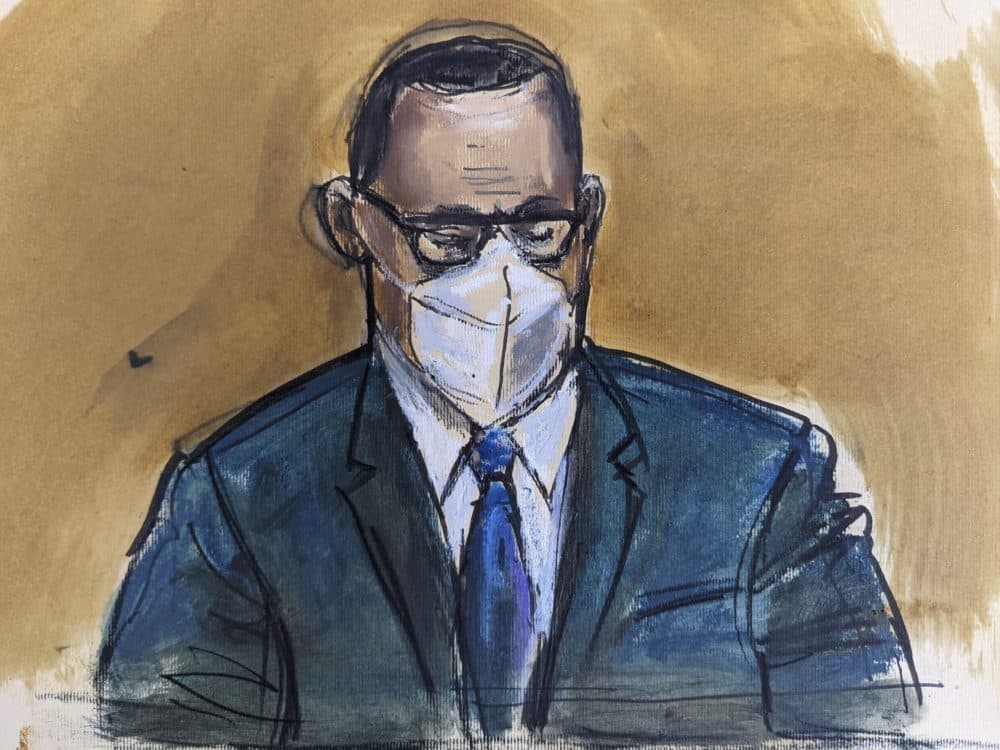Advertisement
'Surviving R. Kelly' Documentary Writer Reacts To Guilty Verdict: Justice Is 'Complicated'

For decades, young women and girls made sexual abuse and misconduct allegations against R. Kelly.
The R&B singer faces the possibility of life in prison after he was found guilty of racketeering and sex trafficking.
His suggestive music alluded to his proclivity for children, and in 2002, Kelly went to trial on charges of making child sex abuse videos. He was found not guilty on all counts.
But it wasn't until several investigative reports, including the six-hour-long 2019 documentary series "Surviving R. Kelly,” that prosecutors took another look at the accusations. "Surviving R. Kelly” is considered the most comprehensive look to date of the allegations against the man once known as “the King of R&B.”
Writer and executive producer of the docuseries, dream hampton, tweeted shortly after the verdict: “Grateful to the survivors. The ones who talked and the ones who didn't.”
For those who survived Kelly’s abuse spanning decades, hampton says she “hopes it feels like the beginning of some justice.”
Hampton has spent much of her adult life organizing against the criminal justice system, prisons and police. So she says justice is complicated — rehabilitation for abusers “doesn’t happen inside prisons,” and survivors’ healing can be a life-long and expensive pursuit.
She notes all the resources at Kelly’s disposal to fuel his predation, like his wealth and private flights. He maintained staff that controlled half a dozen women at a time, she says. And with the reporting around what Kelly’s finances look like, hampton says she’s been thinking about what restitution for survivors looks like.
Interview Highlights
On the media covering survivors’ stories — many women were speaking out from the start
“Jim Derogatis' [21] years of reporting, incredible reporting about Black women, beginning quite frankly with [journalist] Lola Ogunnaike. You know, I can remember her going to Chicago as soon as that local reporting was broken by [Abdon Pallasch], by Mary [Mitchell] and by Jim DeRogatis. And, you know, so the media seeing these women on camera share their stories and reopen that trauma so that people could feel as well as hear them. I think it meant something.”
On Kelly’s case being the first major case after the #MeToo movement to specifically seek justice for Black and Brown women
“I'd like to think that this means that Black women and girls will be taken seriously. And here I'm also talking about extrajudicially, I'm thinking about in our communities, I'm thinking about questions of restorative justice. When women of all races, when victims of sexual crime of all genders go to report these crimes, they're often met with further abuse quite frankly. There's been so much work done around that, I think of Andrea Ritchie's ‘Invisible No More.’ I think of the work that Mariame Kaba has done. So I don't know that a trial is some [ultimate] example of how and where justice can be found. Again, if this brings the victims some relief, if it puts them on a healing journey, then it brings me relief also.”
On reconciling with R. Kelly’s music which is still receiving millions of downloads
“This, too, is a question for the ages. I can't say that I have some clean record on this. I've long stopped listening to R. Kelly, who is considered to be probably the greatest R&B singer of my generation. But it wasn't hard to stop listening to him knowing as early as 2002, when the tape of him abusing a 14 year old went viral on the streets pre-Internet, it was easy to stop putting money in his pocket, knowing how he was using that money.
“For those who find it impossible to stop streaming his records — he's back at 5 million streams a month, which is about his average — just know that your money will go toward a restitution fund for some of his victims. With the conviction, it changes the dynamics of this whole story when it comes to the financial restitution.
“The question of art versus artist is an old one. And like I said, I failed many times. I remember Pearl Cleage from another generation wrote a book about Miles Davis after his autobiography was released and she asked that we boycott him. And I tried and I failed. When I go to the south of France, which I do, I go and I visit the Picasso Museum knowing that this man rearranged the interiors of these women's lives in real life, not just on canvas, [and] that he was incredibly abusive. So this is an age-old question and I don't have the answer to it. But if you are unable to stop listening to R. Kelly, I hope that your money goes toward the victim fund.”
Samantha Raphelson produced and edited this interview for broadcast with Peter O'Dowd. Serena McMahon adapted it for the web.
This segment aired on September 28, 2021.
